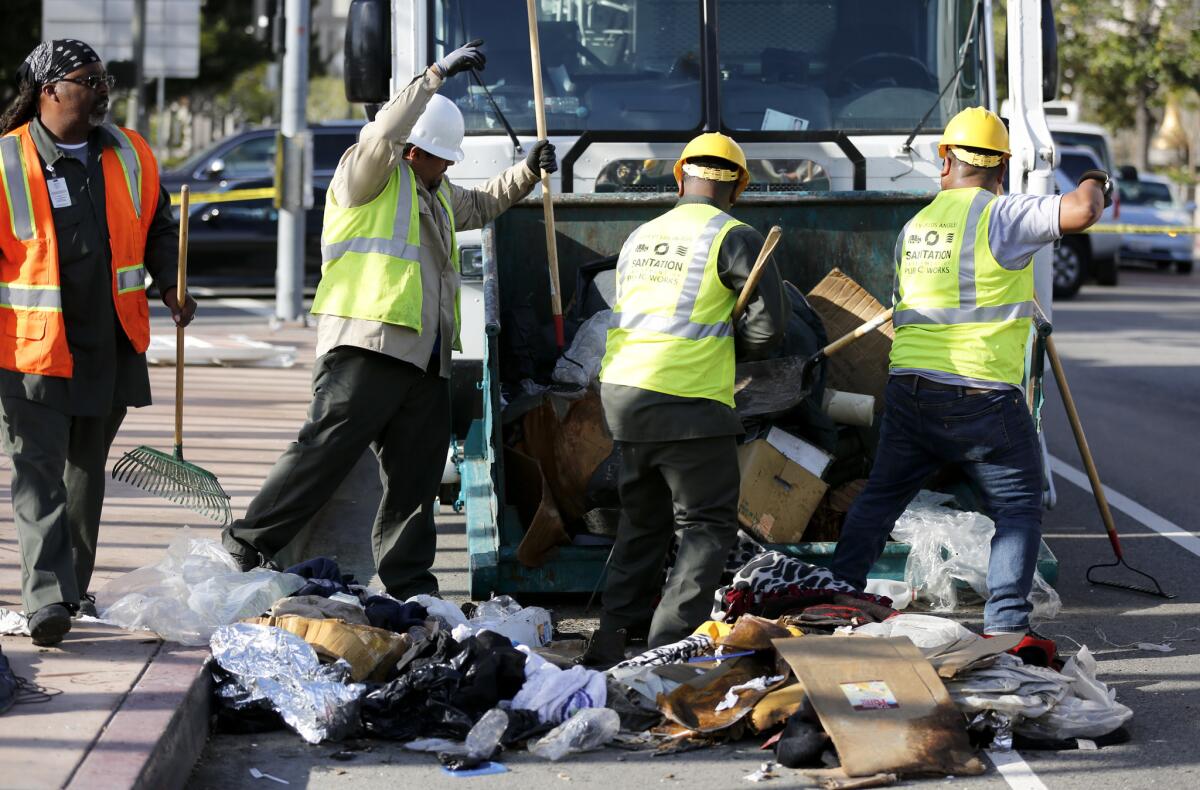Pomona agrees to stop destroying property of homeless people

The city of Pomona will stop seizing and destroying homeless people’s property under a legal settlement with Public Counsel, a Los Angeles public interest law firm. Above, a sweep of homeless people’s belongings in Los Angeles.
The city of Pomona has entered into an agreement with the Los Angeles public interest law firm Public Counsel to stop seizing and destroying the property of homeless people.
In a closed session meeting Monday night, the City Council voted 7-0 to stipulate that it will discontinue practices alleged in a class-action lawsuit as settlement talks go forward.
The lawsuit, filed last month on behalf of 15 named plaintiffs, alleged that the city illegally deprives homeless people of “essential belongings” by confiscating the property without notice and immediately destroying it, rather than placing it in storage.
Among the items taken were food stamps and general relief debit cards, medication, state identification cards, birth certificates, Social Security cards, tents and family photos, the lawsuit alleged.
In a video posted on the Public Counsel website, a plaintiff says the city took away her mother’s ashes in a trash truck.
“My mom’s resting place is a pile of garbage,” Kelley Wilcox said.
According to the agreement, which was submitted for the city attorney’s signature Tuesday, the city will not take property when its owner is present. Property left unattended could be removed after 48 hours’ written notice, but it would have to be placed in storage for at least 90 days.
“The stipulation is an acknowledgment of individuals’ constitutional rights to their property,” said Christina Giorgio, staff attorney of Public Counsel’s Community Development Project.
The eight-page stipulation sets out guidelines for when and how property can be taken. Any property taken, for example, must be stored within one mile of City Hall, and a notice must be posted informing the owner when and where it can be retrieved.
No citations, fines or tickets can be issued to those recovering property.
Exceptions are made for property seized as evidence of a crime or property that “poses a serious and immediate risk to human health and safety, is contraband, is hazardous, or is refuse.” But the stipulation prohibits the police from seizing property as evidence of a violation of Pomona’s city code making it a misdemeanor to camp on public property.
Recyclables and items stored in suitcases or backpacks cannot be treated as refuse.
When unattended property blocks a public sidewalk, city workers will be allowed to move it to clear a pathway of at least 36 inches.
The city agreed to pay a $250 fine for any violation of the agreement.
Assistant City Atty. Andrew L. Jared, who negotiated the agreement, did not return a call from The Times.
But Giorgio praised Jared and the city for their positive response to the lawsuit and willingness to work out a solution to avoid a court battle over a temporary restraining order.
“They have made it very clear they are looking to us to assist them to dramatically reduce the number of people experiencing homelessness,” Giorgio said.
Twitter: @LATDoug
More to Read
Start your day right
Sign up for Essential California for news, features and recommendations from the L.A. Times and beyond in your inbox six days a week.
You may occasionally receive promotional content from the Los Angeles Times.







